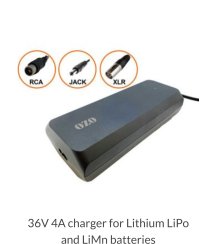- Home
- Forums
- VW California T5 T6 & T6.1 Specific Sections
- VW California T5,T6 & T6.1 Specific Sections
- Electrical
You are using an out of date browser. It may not display this or other websites correctly.
You should upgrade or use an alternative browser.
You should upgrade or use an alternative browser.
WelshGas
Retired after 42 yrs and enjoying Life.
Super Poster
Lifetime VIP Member
All depends on the actual Charger requirements. A photo of the label on the actual Brompton charger would help.I have a Cali Ocean 2019, can I charge a Brompton e-bike not on EHU, I have 200w solar panel.
However it could be problematic.
Also it would be more efficient to charge via 12v rather than an inverter that converts 12v to 230v.
Have you asked Brompton if they do a 12v charger?
This might work.

Travel Charger 12V for Lithium Battery 36V 2A
Travel Charger 12V for Lithium Battery 36V 2A
Last edited:
Ch1pbutty
Super Poster
VIP Member
A lot of chat here:

 www.motorhomefun.co.uk
www.motorhomefun.co.uk

E-Bike Battery Charging on 12V
Hi All I'm hoping the electronics/electrical gurus out there can tell me if I'm on to the right thing to charge my ebike battery when off-grid... Basically, I'm trying to follow the advice to use 12V direct to power items where possible & avoid using inverters, and I though I could you this...
Y
yossarian
Top Poster
Lifetime VIP Member
Your 200W panel can typically produce somewhat less than 1.2kWh per day in summer.
Your leisure batteries have about 1kWh usable energy in them.
A Brompton ebike advertises a battery of about 0.3kWh
From an energy point of view it all looks pretty feasible. Avoiding the inverter is good objective. You might want to look at the protection devices that prevent draining the batteries below a certain voltage (typically used with dashcams).
Your leisure batteries have about 1kWh usable energy in them.
A Brompton ebike advertises a battery of about 0.3kWh
From an energy point of view it all looks pretty feasible. Avoiding the inverter is good objective. You might want to look at the protection devices that prevent draining the batteries below a certain voltage (typically used with dashcams).
GrannyJen
Super Poster
Lifetime VIP Member
as @WelshGas said, depends a lot on your charger. Mine requires an output of 42v.
Might be worth looking at https://uk.jackery.com/pages/portab...7QgGzCnOnmlM8QFFC5FemQipjggQQLKxoC1xwQAvD_BwE
or
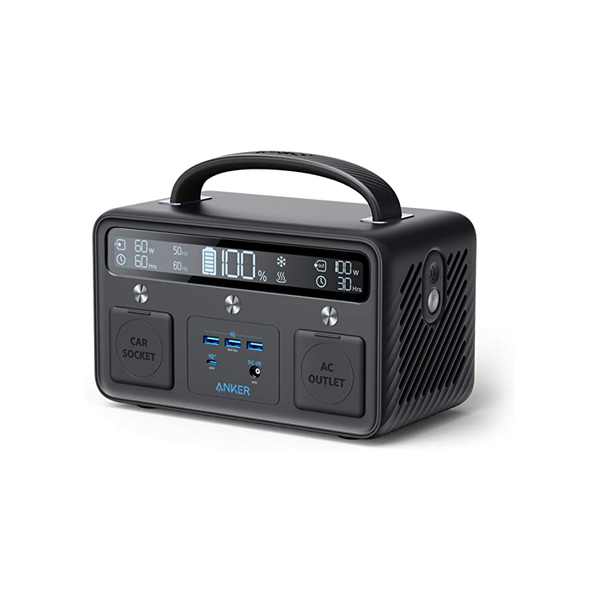
 uk.anker.com
uk.anker.com
Might be worth looking at https://uk.jackery.com/pages/portab...7QgGzCnOnmlM8QFFC5FemQipjggQQLKxoC1xwQAvD_BwE
or

Anker 533 PowerHouse - 389Wh | 300W
The 388Wh capacity provides huge portable power for RVs so you can confidently power essential appliances for longer whenever you are on the road.
 uk.anker.com
uk.anker.com
Kirx
VIP Member
Your 200W panel can typically produce somewhat less than 1.2kWh per day in summer.
Your leisure batteries have about 1kWh usable energy in them.
A Brompton ebike advertises a battery of about 0.3kWh
From an energy point of view it all looks pretty feasible. Avoiding the inverter is good objective. You might want to look at the protection devices that prevent draining the batteries below a certain voltage (typically used with dashcams).
Hias @WelshGas said, depends a lot on your charger. Mine requires an output of 42v.
Might be worth looking at https://uk.jackery.com/pages/portab...7QgGzCnOnmlM8QFFC5FemQipjggQQLKxoC1xwQAvD_BwE
or

Anker 533 PowerHouse - 389Wh | 300W
The 388Wh capacity provides huge portable power for RVs so you can confidently power essential appliances for longer whenever you are on the road.uk.anker.com
Thank you for your reply.
The info on the charger says 36v, 300wh and capacity 8.55ah is this more helpful?
Also would an inverter be ok to use when driving, would this take pressure off of the leisure batteries?
Kirstie
Y
yossarian
Top Poster
Lifetime VIP Member
The units more likely tie up with your battery not the charger.The info on the charger says 36v, 300wh and capacity 8.55ah is this more helpful?
Yes and yes.Also would an inverter be ok to use when driving, would this take pressure off of the leisure batteries?
If you want an occasional charge by all means try see if your if your inverter is up to the task. Risks are:
- Undesirable waveform doesn't play nicely with your charger
- Charger overloads inverter
- Inefficient
Edit: it's possible that you might find a 12V charger with integral low voltage protection.
Last edited:
WelshGas
Retired after 42 yrs and enjoying Life.
Super Poster
Lifetime VIP Member
The Charger I linked to has such protection, switching off at 11v.The units more likely tie up with your battery not the charger.
Yes and yes.
If you want an occasional charge by all means try see if your if your inverter is up to the task. Risks are:
If you want to charge regularly I'd suggest a 12V charger (see @WelshGas' post above for an example) and some sort of low voltage protection device. Something like https://www.amazon.co.uk/dp/B01B8HI4U6/?tag=unique09f-21 assuming it can handle the current required by your chosen 12V charger.
- Undesirable waveform doesn't play nicely with your charger
- Charger overloads inverter
- Inefficient
Edit: it's possible that you might find a 12V charger with integral low voltage protection.
WelshGas
Retired after 42 yrs and enjoying Life.
Super Poster
Lifetime VIP Member
OK.Hi
Thank you for your reply.
The info on the charger says 36v, 300wh and capacity 8.55ah is this more helpful?
Also would an inverter be ok to use when driving, would this take pressure off of the leisure batteries?
Kirstie
Your charger , at 300w running from a Mains supply would require a current of about 1.3amps/hr.
However, running from an Inverter , would mean the 12v Inverter supply being about 25 amps/hr.
The Inverter would have to be larger than 300w as most e-bike chargers give 42v on startup rapidly dropping to 36v, so a 500w Inverter is probably required, wired directly to the Leisure Battery with thick cables and fused appropriately.
You could run it for 3 hrs before your Leisure Batteries are down to 50% or less as it would be using at least 25amps/hr, unless you run your engine. This would be fore charging 1 bicycle from flat.
Using an inverter is less efficient because of heat production and inefficiency 12v>230v>36v.
Your charger run from an Inverter will charge at 8.5amps/hr until the bike battery is full and there is no Battery protection, unless the Inverter has this capability or you wire a separate unit in circuit.
The unit I linked to has a maximum charge rate of 2amps/hr at 36v so about 6amps/hr required from the 12v Leisure circuit, and also has built in protection to switch off if the Leisure batteries drop to 11v.
So about £600+ for a good inverter + battery protection and wiring.
or
99€ about £80 for the above 12v unit.
WelshGas
Retired after 42 yrs and enjoying Life.
Super Poster
Lifetime VIP Member
Hope it works out for you. Let us know how you get on.I couldn’t really justify spending £600, so I’ve purchased the 12v unit instead.
Thank you for your help
Best wishes, Kirstie
Kirx
VIP Member
OK.
Your charger , at 300w running from a Mains supply would require a current of about 1.3amps/hr.
However, running from an Inverter , would mean the 12v Inverter supply being about 25 amps/hr.
The Inverter would have to be larger than 300w as most e-bike chargers give 42v on startup rapidly dropping to 36v, so a 500w Inverter is probably required, wired directly to the Leisure Battery with thick cables and fused appropriately.
You could run it for 3 hrs before your Leisure Batteries are down to 50% or less as it would be using at least 25amps/hr, unless you run your engine. This would be fore charging 1 bicycle from flat.
Using an inverter is less efficient because of heat production and inefficiency 12v>230v>36v.
Your charger run from an Inverter will charge at 8.5amps/hr until the bike battery is full and there is no Battery protection, unless the Inverter has this capability or you wire a separate unit in circuit.
The unit I linked to has a maximum charge rate of 2amps/hr at 36v so about 6amps/hr required from the 12v Leisure circuit, and also has built in protection to switch off if the Leisure batteries drop to 11v.
So about £600+ for a good inverter + battery protection and wiring.
or
99€ about £80 for the above 12v unit.
It’s asking for RCA, XLR or Jack? Any idea which one it need?Hope it works out for you. Let us know how you get on.
WelshGas
Retired after 42 yrs and enjoying Life.
Super Poster
Lifetime VIP Member
If none of those plugs are suitable, try here.It’s asking for RCA, XLR or Jack? Any idea which one it need?
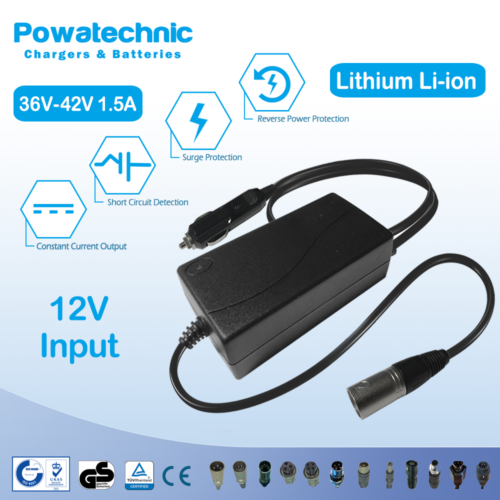
12V Car Cigarette lighter invert to 42V 1.5A light duty Charger for 36V battery | eBay
Find many great new & used options and get the best deals for 12V Car Cigarette lighter invert to 42V 1.5A light duty Charger for 36V battery at the best online prices at eBay! Free delivery for many products.
www.ebay.co.uk
Kirx
VIP Member
If none of those plugs are suitable, try here.

12V Car Cigarette lighter invert to 42V 1.5A light duty Charger for 36V battery | eBay
Find many great new & used options and get the best deals for 12V Car Cigarette lighter invert to 42V 1.5A light duty Charger for 36V battery at the best online prices at eBay! Free delivery for many products.www.ebay.co.uk
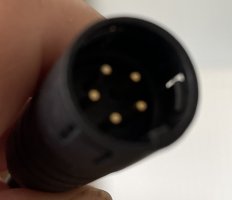
WelshGas
Retired after 42 yrs and enjoying Life.
Super Poster
Lifetime VIP Member
Any joy?Don’t worry I have WhatsApp the company selling these with a photo of the adapter. They’ll be able to help.
Thank you
H
haydnw2
I had no reply from that company to WhatsApp and email asking about a charger for my Orbea.No, none whatsoever. No inverter has an adapter at fits the Brompton battery. I’m away now, with my bike but will have to book a campsite to use the EHU to charge.
Kirstie
I have plumped for one of these, which analogous to the EcoRiver mentioned by @leeb
jonr71
VIP Member
Ecoflow River Pro https://uk.ecoflow.com/products/river-pro-portable-power-stationI repeat....an ecoriver pro does the trick
L
leeb
That's the one I meant...my dyslexia strikes again!.
Fast charging on mains when hooked up ...slow charge from cigarette lighter when on move. Could use solar when off grid. The 750 watt full charge will easily charge or top up our ebikes
Fast charging on mains when hooked up ...slow charge from cigarette lighter when on move. Could use solar when off grid. The 750 watt full charge will easily charge or top up our ebikes
jonr71
VIP Member
I have the River Max for exactly this: 576wh is also enough for me. 2 critical benefits for me are the built in MPPT controller and 600w output means bike charging works. Then it's also a safety net for the leisure batteries especially when off grid for a few days.That's the one I meant...my dyslexia strikes again!.
Fast charging on mains when hooked up ...slow charge from cigarette lighter when on move. Could use solar when off grid. The 750 watt full charge will easily charge or top up our ebikes
Viktorgeorge
Starlight Blue Ocean 4Mo MY2023 older bellows
Lifetime VIP Member
Lots of help from members, thank you, on this string and on:

 vwcaliforniaclub.com
vwcaliforniaclub.com
It seems to me that the option of using the built in inverter - as originally proposed here https://vwcaliforniaclub.com/threads/charging-e-bike-batteries.23598/post-272240 - is likely to be risky and inefficient so the alternatives are:
(i) To use a 12v charger (Bosch no longer make one) such as this:
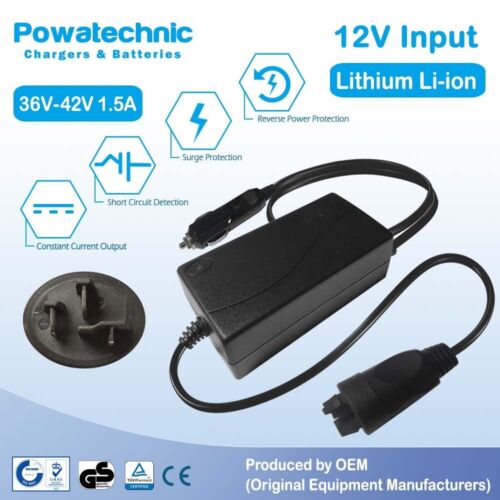
(ii) or an Ecoflow River Max (or similar for example: https://lvyuan.co/en-gb/products/lv...-for-outdoors-camping-travel-hunting-blackout.)
(iii) buy a larger inverter as @WelshGas gas describes above, with associated safety devices.
The (ii) option is more expensive but it has plenty of other uses, whilst (iii) is as expensive with fewer other uses. As I understand it you can re-charge the River Max or similar unit from the California battery/alternator in a period of perhaps an hour or two (obviously best when driving) from one of the 12v sockets, but perhaps someone could confirm.
Has anyone got personal experience in regular use of the option (i)? I am guess it would be OK to top up a battery but very slow to fully recharge one.

240v socket only works when hooked up. Is this correct?
Hi Team - we're new to owning a Cali Ocean 4 motion 6.1, so apologies if this is a daft question. When hooked up to mains supply, our 240v socket next to the sink works fine. We've tested on a 750w kettle. However, there is no power to the socket, when mains hook up is disconnected. Is...
It seems to me that the option of using the built in inverter - as originally proposed here https://vwcaliforniaclub.com/threads/charging-e-bike-batteries.23598/post-272240 - is likely to be risky and inefficient so the alternatives are:
(i) To use a 12v charger (Bosch no longer make one) such as this:

12V Car Cigarette lighter invert to 42V 2A Charger for 3 pin Bosch 36V battery | eBay
Find many great new & used options and get the best deals for 12V Car Cigarette lighter invert to 42V 2A Charger for 3 pin Bosch 36V battery at the best online prices at eBay! Free delivery for many products.
www.ebay.co.uk
(ii) or an Ecoflow River Max (or similar for example: https://lvyuan.co/en-gb/products/lv...-for-outdoors-camping-travel-hunting-blackout.)
(iii) buy a larger inverter as @WelshGas gas describes above, with associated safety devices.
The (ii) option is more expensive but it has plenty of other uses, whilst (iii) is as expensive with fewer other uses. As I understand it you can re-charge the River Max or similar unit from the California battery/alternator in a period of perhaps an hour or two (obviously best when driving) from one of the 12v sockets, but perhaps someone could confirm.
Has anyone got personal experience in regular use of the option (i)? I am guess it would be OK to top up a battery but very slow to fully recharge one.
Last edited:
Similar threads
- Replies
- 95
- Views
- 18K
Y
- Replies
- 6
- Views
- 2K
- Home
- Forums
- VW California T5 T6 & T6.1 Specific Sections
- VW California T5,T6 & T6.1 Specific Sections
- Electrical

About us
The VW California Club is the worlds largest resource for all owners and enthusiasts of VW California campervans.



